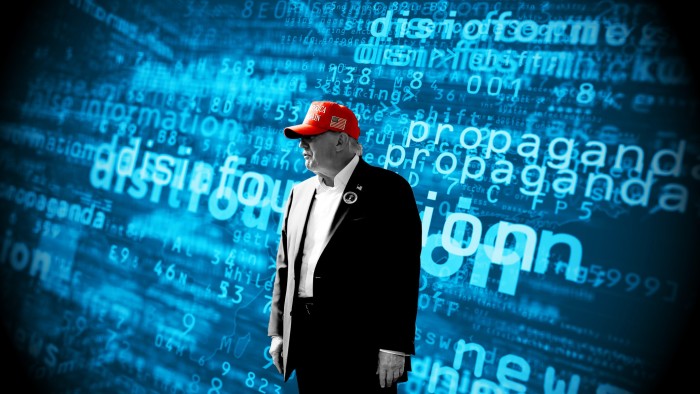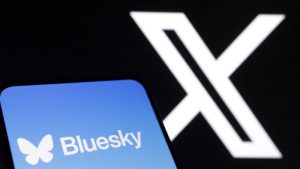Donald Trump’s return sends shivers through the anti-misinformation world

The incoming Trump administration’s vow to dismantle the leftwing “censorship cartel” has thrown a shadow over the cottage industry of academics, non-profits and researchers that sprang up to combat a tide of digital misinformation — and threatens to disrupt the Big Tech companies behind the world’s most popular platforms.
Researchers fear Donald Trump will make good on his past promises to crack down further on the misinformation field in the US for alleged “election interference”. Among those threats, he has said he would seek to curb funds to any universities found to have engaged in censorship activities “such as flagging social media content for removal or blacklisting” for at least five years.
He has signalled the seriousness of his intentions by choosing Brendan Carr as the new chair of the Federal Communications Commission. The Republican commissioner has echoed the forthcoming president’s rhetoric on “free speech” and “dismantling censorship”. Trump’s efforts have also received public support from Silicon Valley heavyweights, including a16z co-founder Marc Andreessen and billionaire entrepreneur Elon Musk, now one of the president-elect’s most visible allies.
“I think it will be just a tsunami of critiques and witch hunts,” said Megan Squire, the deputy director for data analytics at the Southern Poverty Law Center. “I suspect some people in academia where you get to choose your research will self-censor or soften their research, or shift their application area.”
“We are all just waiting with bated breath,” she added.

“I’m pretty fucking scared,” said one professor in the field, speaking on condition of anonymity due to fears of retribution. “If this stuff happens, I will be on a plane [out of America].”
Another professor said the rhetoric had placed pressure on individuals but also universities and colleges at an institutional level, and that discussions were being held internally about how to prepare. “It’s an existential threat to my livelihood and [our] research funding.”
Social media platforms could also be targeted, as Trump has suggested he would seek revisions to Section 230 of the Communications Decency Act, which grants social media companies immunity from being sued for content that appears on their platforms. Doing so, he said, would “get platforms out of censorship business”.
Shortly before his nomination, Carr wrote on X that Meta’s Mark Zuckerberg, Google’s Sundar Pichai, Apple’s Tim Cook and Microsoft’s Satya Nadella “played central roles in the censorship cartel” by working with NewsGuard, a for-profit fact-checking group that rates the quality and trustworthiness of news sites. Carr sent a letter to the executives asking for information on their involvement with the group, which maintains that it is apolitical.
The notion of misinformation — false information that may be shared unwittingly — and disinformation — shared with explicit intent to deceive — exploded into the mainstream following Trump’s 2016 win, after US investigators found evidence that a Russian troll farm had sought to interfere in the vote.
The Covid-19 pandemic also became a significant flashpoint, with health officials warning that there was an “infodemic” of fake news and conspiracy theories related to the disease and its vaccines.
Academics and researchers in the emerging sphere argue that their work sheds important light on the information ecosystem at a time when US adversaries such as Iran, China and Russia have been ramping up online influence campaigns. Some foundations have progressive backers, while others are non-partisan. Many say their research is apolitical.
Trump and his allies — including Musk, who owns the platform X — say they are protecting free speech and shining a much-needed light on what they see as the weaponisation of disinformation research. They argue universities and non-profits colluded with government and social media platforms during the Biden administration to quash conservative speech that they did not like.
“Every participant in the orchestrated government-university-non-profit-company censorship machine of the last decade can be charged criminally under one or both of these federal laws,” Trump donor Andreessen wrote on X earlier this month, citing laws around deprivation of rights and conspiracy against rights that are typically invoked for kidnapping or sexual abuse crimes.
Berin Szóka, president of TechFreedom, a non-partisan think-tank, said he expected the incoming administration to explore that avenue. “When Marc Andreessen talks about criminal prosecutions, I think he believes that [they will happen],” he said.
The threats themselves can have a chilling effect. “All they have to do is threaten criminal litigation to get people to stop doing research,” Szóka said.
Stanford University and the University of Washington have already either folded or refocused their work on viral election misinformation after being inundated with information requests and subpoenas from Jim Jordan, a Republican congressman who chairs the House judiciary committee, costing them hefty legal fees.
Some have banded together to create the Researcher Support Consortium, which offers guidance for what it says are “co-ordinated campaigns of intimidation and harassment in response to their important public-facing work”. Meanwhile, donors that previously backed disinformation non-profits have grown nervous, according to people familiar with their thinking.
Others see the chance to correct past overreaches. Ari Cohn, lead counsel for tech policy at the Foundation for Individual Rights and Expression, a non-profit that aims to protect free speech, welcomed any move that would curtail government actors from “jawboning”, or pressuring, companies into taking down speech. There is also widespread support for a law that would require disclosure of communications over moderation between governments and social media platforms.
These have been a particular concern for Republicans, who accused the Biden administration of coercing Big Tech to muzzle Americans — for example, Biden administration staff asked Meta to take down a Leonardo DiCaprio meme with an anti-vaccine message, for example.
However, independent university research is protected by the First Amendment, experts say, and free-speech advocates agree it should remain so. “The idea of stripping university funding for those who dare to research misinformation and disinformation is disquieting from an academic freedom standpoint,” said Cohn.
During his first presidency, Trump did attempt to revise Section 230, which most tech platforms opposed and ultimately stalled out. “When he started waging war on content moderation . . . he ran out of time and didn’t have the loyalists in place to carry out what he wanted. Now he has both time and the people he needs,” said Szóka.
Tech platforms seem more eager than in the past to stay out of the political tug of war over information, according to experts. Meta moved ahead of the election to de-emphasise political content, and YouTube is also “trying to stay under the radar,” said Brendan J Nyhan, professor in government at Dartmouth College. “The platforms have stepped back from these issues,” he said.
#Donald #Trumps #return #sends #shivers #antimisinformation #world







